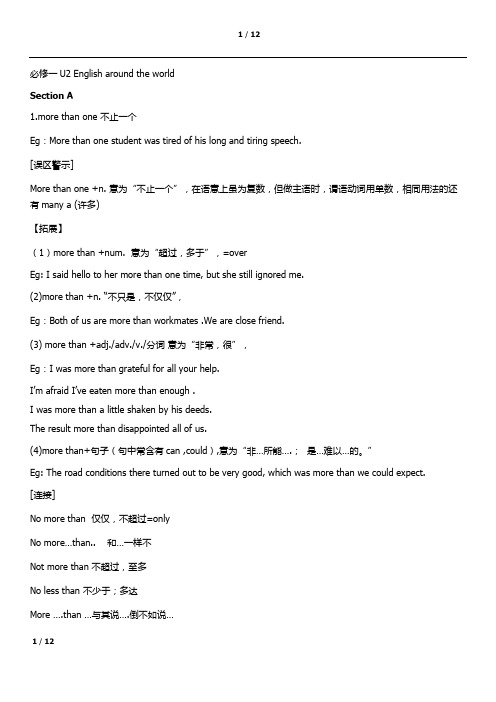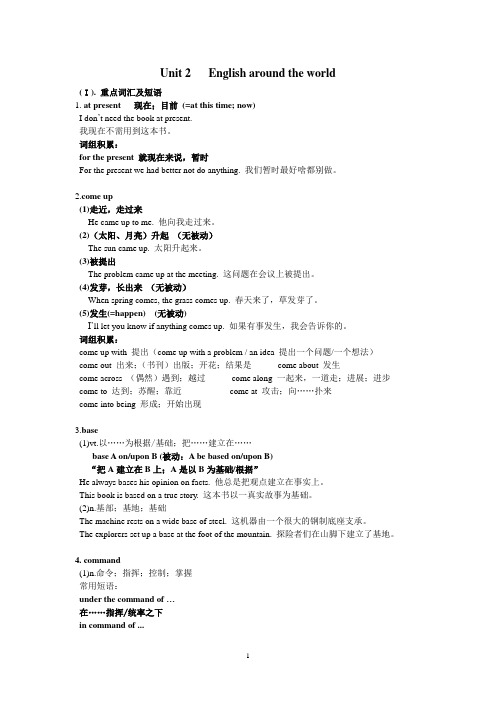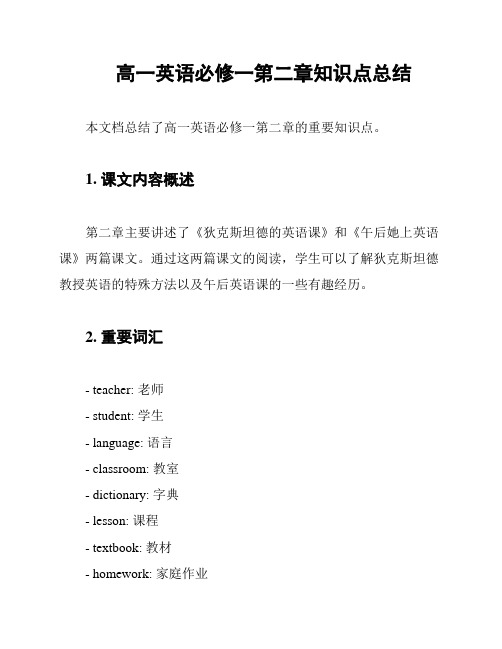最新英语必修一第二单元重要知识点整理
人教版高一必修一 第二单元知识点全面总结 归纳

必修一U2 English around the worldSection A1.more than one 不止一个Eg:More than one student was tired of his long and tiring speech.[误区警示]More than one +n. 意为“不止一个”,在语意上虽为复数,但做主语时,谓语动词用单数,相同用法的还有many a (许多)【拓展】(1)more than +num. 意为“超过,多于”,=overEg: I said hello to her more than one time, but she still ignored me.(2)more than +n. “不只是,不仅仅”,Eg:Both of us are more than workmates .We are close friend.(3) more than +adj./adv./v./分词意为“非常,很”,Eg:I was more than grateful for all your help.I’m afraid I’ve eaten more than enough .I was more than a little shaken by his deeds.The result more than disappointed all of us.(4)more than+句子(句中常含有can ,could),意为“非…所能….;是…难以…的。
”Eg: The road conditions there turned out to be very good, which was more than we could expect.[连接]No more than 仅仅,不超过=onlyNo more…than.. 和…一样不Not more than 不超过,至多No less than 不少于;多达More ….than …与其说….倒不如说…Less than 不足,不到;少于Rather than而不是Other than 除了2.voyage n. 航行;尤指航海或航空The sea became calm after the storm, so they decided to make a voyage . The scientist planned to go on a voyage to the Moon.[拓展]Make /take a voyage 去航海,去航行Go on a voyage 正在航海;正在航行表示动作Be on a voyage 正在航海;正在航行表示状态【辨析】voyage ,journey ,trip, tour, travelVoyage n.[C] 指海上旅行或航行Eg:he went on a voyage around the world.【辨析】Journey n. [C] 常指远距离的陆地旅行,也指“旅程,旅途”Eg:Wish you a pleasant journey.Trip n.[C]指短途,短期旅行,远足,也指“因事出行”They made a trip to the seaside last weekend .Tour n.[C,U] 指团队观光旅游,也可表示“巡视,巡回比赛”或“演出”Eg:I prefer a walking tour.The band is on tour in France.Travel n.[C,U] 常指长距离旅行,或国外旅行,是旅行的总称The novel is based on his travel in India.3.even if =even though 即使,虽然Eg:Even if he suffered from a lot of difficulties, he never gave in .【误区警示】①even if/even though 引导让步状语从句,主句用一般将来时,从句用一般现在时表示将来Eg:Even if I fail this ,I will try again.②as if/though 好像,仿佛引导方式状语从句或表语从句Eg:It looks as if it’s going to rain.e up(1) 走近;上前;赶上My teacher came up and talked with me face to face.(2)(被)提出,(被)谈到Eg: In order to finish the task on time, a good piece of advice came up at the meeting.(3)(太阳,月亮)升起;露出地面,发芽;出席,到场Eg:The sun has come up .She came up for the interview but didn’t get the job.The spring is coming and green grass is coming up.[误区警示] come up 做“被提出,被谈到”讲时为不及物动词短语,不能用于被动;come up with 主语为人,“提出”,宾语为表示“建议,计划,方案等”名词Eg:Your name came up in our conversation once or twice.She came up with a new idea at the meeting.【拓展】Come up to 达到(标准等),比得上Come on 赶快,加油Come about 发生Come across 邂逅,偶遇Come to 达到;苏醒,共计Come over走过来,顺便拜访Come out 出现;真相大白;结果是;出版;开花Eg: How did the problem come about?I come across an old friend t the party.5.actually adv.(1)(在口语中用于强调事实),实际上,事实上Eg:I don’t actually remember it.It seemed as if they fell in love with each other, but actually she disliked him. (2)(表示想法与事实不一致而感到惊奇) 居然;竟然He is actually over fifty years old.(3)(礼貌地纠正他人) 实际上,事实上Growing vegetables looks easy, but actually it takes a lot of learning .(4)(用于引起鄙人注意或转移话题)说实在的Actually ,I’m busy at the moment,--can I call you back later?[拓展]In actual fact=as a matter of fact =in reality/fact =actually 事实上;实际上6.base vt. 以…为根据n. 基部;基地;基础base…on/upon 把…建立,在…上be based on /upon 以…为基础;改编自One should always base his opinion on facts.In my dairy ,I set down a series of things that are all based on facts.They settled down at the base of the mountain.Do you know where the air base is? 空军基地These politics have a broad base of the masses.【辨析】Base 表示具体含义,意为“根基,基础,底座” the base of a building . 底座Basis 表示抽象含义,意为“基础”, the economic basis 基础【单词积累】Basic adj. 基本的,基础的;根本的Basically adv. 基本地;主要地7.at present =at the present time= in the present 现在,目前Eg: At present, I am suffering from a bad back.I’m getting along well with my new classmates at present.I’m very busy at present ,and I can’t join in your game .[拓展](1)present 做形容词时位置不同,意义不同;做前置定语,意为“现在的,当前的”;做后置定语时,意为“出席的,到场的”Eg:Did you see the present government leaders? 你见到现任政府领导人了吗Did you see the government leaders present ? 你见到在场的政府领导人了吗(2)做动词,意为“把…交给,颁发”。
必修一英语Unit2知识点详解

Unit2(一)词汇1. commandn. & vt. 命令;指令;掌握The officer commanded his soldiers to fire. 那名军官命令士兵们开火。
A general is a man who commands a large number of soldiers.将军是统率众多士兵的人。
常用结构:①at/ by sb’s command 听某人支配②take command of 控制③in command of 指挥着④under one’s command 由某人的指挥⑤under the command of sb. 在某人的指挥下⑥command sb. to do sth. 命令某人做某事⑦command (=order) that ... 命令……(从句用虚拟语气,即should+ do 形式,should可省略)联想拓展commander n. 指挥官2. requestvt.&n. 请求;恳求;要求常用结构:①request sb. to do sth.请求某人做某事②request sth. from/of sb. 向某人要求某物③request that sb. (should) do sth.要求某人做某事④make a request/requests 发出请求⑤at the request of sb.=at sb.’s request依照某人的请求易混辨析request/demand/requirerequest表示“有礼貌的请求;正式的请求”。
demand表示“有正当权利的要求”,因此含有“坚决或强烈要求”的意思。
require表示“要求所必须的东西;法律、协定、规章以及其他客观情况的要求”。
但它们也有不同之处:Page No.47①require和request都可以接宾语+to do sth.结构,而demand没有此种用法。
高一英语必修1Unit2知识梳理、重点词汇解析人教版

人教版高一英语必修一Unit2知识梳理、重点词汇解析及单元自测Unit2一、知识点1. go to the pictures去看电影(美);go to the movies 去看电影(英)2. …list the countries that use English as an official language 列举把英语用作官方语言的国家3. the road to …通向……之路4. at the end of在……末端,在……尽头,by the end最后(=finally)5. because of 因为…… (注意和because 的区别)Many beautiful fish are fast disappearing because of the severe pollution.因为污染严重,许多美丽的鱼类正在面临绝种。
An argument was inevitable because they disliked each other so much.争论是不可避免的,因为他们彼此非常厌恶。
6. native English speakers 以英语作为母语的人7. even if (= even thoug)即使,用来引导一个让步状语从句,后面既可用陈述语气,也可用虚拟语气,但是even if/even though,引导的从句中不用将来时。
如:Even though/if it rains tomorrow, we will leave for Beijing.8. come up 走上前来,走近,发生,出现 come up with 追上,赶上,提出9. Actually all languages change and develop when cultures meet and communicate with each other.事实上,当不同文化相互交流渗透时,所有的语言都会有所发展、有所变化。
高中英语必修一第二单元复习资料

Unit 2 English around the world(Ⅰ).重点词汇及短语1. at present 现在;目前(=at this time; now)I don’t need the book at present.我现在不需用到这本书。
词组积累:for the present 就现在来说,暂时For the present we had better not do anything. 我们暂时最好啥都别做。
e up(1)走近,走过来He came up to me. 他向我走过来。
(2)(太阳、月亮)升起(无被动)The sun came up. 太阳升起来。
(3)被提出The problem came up at the meeting. 这问题在会议上被提出。
(4)发芽,长出来(无被动)When spring comes, the grass comes up. 春天来了,草发芽了。
(5)发生(=happen) (无被动)I’ll let you know if anything comes up. 如果有事发生,我会告诉你的。
词组积累:come up with 提出(come up with a problem / an idea 提出一个问题/一个想法)come out 出来;(书刊)出版;开花;结果是come about 发生come across (偶然)遇到;越过come along 一起来,一道走;进展;进步come to 达到;苏醒;靠近come at 攻击;向……扑来come into being 形成;开始出现3.base(1)vt.以……为根据/基础;把……建立在……base A on/upon B (被动:A be based on/upon B)“把A建立在B上;A是以B为基础/根据”He always bases his opinion on facts. 他总是把观点建立在事实上。
高一英语必修一unit2知识点

高一英语必修一unit2知识点知识给人以爱,给人以光明,给人以智慧,应该说知识就是幸福,因为有了知识,就是摸到了有史以来人类活动的脉搏,否则就不懂人类生命的音乐!下面给大家分享一些关于高一英语必修一unit2知识点,希望对大家有所帮助。
高一英语必修一unit2知识1重点词汇、短语1. because of 因为、由于2. come up 走近、上来、提出3. actually 实际上、事实上4. base 以…为基础,根基5. at present 目前6. make use of 利用7. such as 例如8. command 命令、指令、掌握9. request 请求、要求10. play a part/role in 扮演一个角色11. recognize 辨认出、承认、公认12. straight 直接、挺直、笔直的13. be different from 与…不同be the same as 和…一样14. one another 相互,彼此(=each other)15. at the end of 在…结束时16. because of 因为(后接名词或名词性短语)because 因为(后接句子)17. be based on 根据,依据18. at present 目前;当今19. especially 特别,尤其specially 专门地20. make use of 利用…make the best of 充分利用…21. a large number of 大量的,很多(作主语时,谓语动词用复数)the number of …的数量(作主语时,谓语动词用单数)22. in fact = actually= as a matter of fact 事实上23. make lists of… 列清单24. included 包括(前面接包括的对象)including包括(后面接包括的对象)25. command sb. to do sth. 命令某人去做某事command + that 从句(从句用should+V原)26. request sb. to do sth. 要求某人做某事request + that 从句(从句用should+V原)高一英语必修一unit2知识2重点句型1. World Englishes come from those countries where English plays an important role as a first or second language, either because of foreign rule or because of its special role as an international language.(定语从句)世界英语来自那些以英语为第一或第二语言的国家,英语在这些国家起重要作用,或是因为外国的统治,或是因为其作为国际语言的特殊地位。
高一英语必修一第二章知识点总结

高一英语必修一第二章知识点总结本文档总结了高一英语必修一第二章的重要知识点。
1. 课文内容概述第二章主要讲述了《狄克斯坦德的英语课》和《午后她上英语课》两篇课文。
通过这两篇课文的阅读,学生可以了解狄克斯坦德教授英语的特殊方法以及午后英语课的一些有趣经历。
2. 重要词汇- teacher: 老师- student: 学生- language: 语言- classroom: 教室- dictionary: 字典- lesson: 课程- textbook: 教材- homework: 家庭作业3. 语法要点- 现在进行时:用于表示正在进行的动作或状态,构成为“be动词 + 动词-ing”。
例如:I am reading a book.- 一般现在时:用于表示经常性的动作或事实,构成为动词原形。
例如:She studies English every day.- 定冠词和不定冠词:用于表示特定事物或泛指事物。
例如:a book / the book.4. 阅读技巧- 熟练阅读课文,理解文章大意和细节。
- 注重词汇积累,通过查字典研究不熟悉的词汇。
- 注意抓住文章中的关键句子和重要信息。
5. 写作要点- 练写作简单的英语句子,如描述人物、物品、日常活动等。
- 注意语法和拼写的正确性。
- 多阅读英文文章,积累写作素材和提高写作技巧。
以上是对高一英语必修一第二章知识点的总结。
希望这份文档可以帮助您更好地研究和理解该章节的内容。
(字数:171)Note: The provided content is a general summary and does not include specific details from the chapter.。
高中英语 人教版必修一unit 2 travelling Around 知识清单
必修一Unit.2 Travelling Around1.重点单词1.Apply vi申请;请求;vt 应用;涂(油漆、乳剂)——application. n. 应用;用途;申请--- applicant. 申请者< 1> 申请apply for< 2>向某人申请某物apply to sb for sth< 3>把某物应用到某物中apply sth to sth< 4>致力于apply oneself to< 5>求职信a job application< 6>申请信a letter of application2 pack收拾(行礼)包装;打包行李n 纸包;包裹。
< 1>一包,一帮,一群a pack of< 2>将装箱打包pack sth up< 3>The walk is expected to last all day, so bring a ( pack ) ___packd_________lunch.3.Amazing. Adj 令人惊奇的;令人惊喜的;amaze---使吃惊;惊讶的;amazed 惊奇的;惊喜的---amazement. n惊异;惊愕< 1>对。
大为吃惊的be amazed at/by/that< 2>因做某事而感到吃惊,惊讶be amazed to do sth< 3>令某人惊奇的是to one’s amazement< 4>惊讶地in amazement< 5>让人吃惊的,古代的认们能够建造出如此伟大的建筑。
(it作形式主语)It is amazing that the ancient people could have built such great architecture.4.Arrange vt/vi安排,筹划———arrangement n.安排,筹备< 1>安排做某事arrange to do sth< 2>为某人安排某事arrange sth for sb< 3>为、、、做安排、准备make arrangements for< 4>谈妥,达成协议arrive at an arrangementThe books were all neatly in place, carefully arranged_________.5.Recognize vt 辨别出,承认;认可;认识;认知——recognition 识别;承认,认出< 1>通过。
高一英语必修一unit2语法知识点
高一英语必修一unit2语法知识点高一英语必修一 Unit 2 语法知识点英语语法是学习英语的基础,能够正确运用语法知识对于提高英语水平非常重要。
本文将介绍高一英语必修一 Unit 2 的语法知识点,帮助同学们更好地理解和运用。
一、被动语态被动语态是英语中的一种重要的句子结构。
在被动语态中,动作的承受者(也就是主语)成为动作的发出者。
被动语态的一般结构是“be + 过去分词”。
1. 当主动句的主语是第三人称(he, she, it, them等)时,用be 动词的第三人称形式(is, are);如果是一般疑问句,将be动词放在句首;否定句在be动词后面加not。
例句:The book is written by Mark Twain. 这本书是马克·吐温写的。
Is the book written by Mark Twain? 这本书是马克·吐温写的吗?The book is not written by Mark Twain. 这本书不是马克·吐温写的。
2. 当主动句的主语是第一人称(I, we, they等)或第二人称(you)时,用are;如果是一般疑问句,将are放在句首;否定句在are后面加not。
例句:We are called by the teacher. 我们被老师叫了。
Are we called by the teacher? 我们被老师叫了吗?We are not called by the teacher. 我们没被老师叫。
二、情态动词情态动词是用来表示说话人对动作发生的程度、可能性、目的、能力等,常见的情态动词包括can, could, may, might, must, shall, should, will, would, need等。
1. can/could 表示能力或许可例句:I can swim. 我会游泳。
Can you speak English? 你会说英语吗?2. may/might 表示可能性例句:It may rain tomorrow. 明天可能会下雨。
高一英语必修1Unit2知识梳理、重点词汇解析人教版(4)整理
高一英语必修1Unit2知识梳理、重点词汇解析人教版(4)整理重点词组(旨在供应综合运用所需材料)e up走近;上来;提出[典例]1). The little came up to the stranger and showed him how to get to the police station.小男孩向生疏人走去,并告知他去警察局的路。
3). It is certain that the question will come up at the meeting. 这个问题在会议上肯定会被提出来的。
5). I am afraid something urgent has come up. 唯恐发生了什么急事。
[短语归纳]come across邂逅come about发生come at向扑来,攻击come from 来自come out 出版;开花;结果是come up with想出come round 绕道而来come down落下,塌下[练习] 用come构成的词组填空。
1). The hunter walked across the forest when suddenly a bear_______ him.2). The magazine __________ once a month.3). I wish you can ___________ to England on your holiday.4). The engineers has ______________ new ways of saving energy.5). They ___________ an old school friend in the street this morning.答案: 1). came at 2). comes out 3). come over 4). come up with 5). came across2. make use of 利用;使用[典例]1). You ought to make good use of any opportunity to practise English. 你应当好好利用机会练习英语。
高中英语必修一Unit2知识点总结
精品文档Unit 2 English around the world一、单词识记命令 1.________________ n.& vt.2. ________________ adv. really请求 ,要求 3._________________ n.& vt.承认 ,辨认出 4._________________ vt.闪电 5._________________ n.地的 / 本国 6._______________ adj.直的 7._______________ adj. 直接 adv.后者的 ,较后的 8._______________ adj.毒气 ;气体 ;汽油 9._______________ n.阻塞 vt.街区 10.________________ n.11.identity n. __________________12.eastern adj.__________________13.official adj.___________________14.voyage n. _____________________15.gradual adj. _____________________16.vocabulary n. _____________________17.elevator n. _____________________18.apartment n. _____________________19.expression n. _____________________20.accent n. _____________________二、词汇拓展基地 ;基部 n.为根据以 1. base vt.; 基础的 ___________adj. 主要地 ; 实际上 ;基本上___________adv根.本的基准 ;要素 ;基础 ___________n.Merry,whose husband serves in an air base,believes that the _______ (base of a⑴good marriage is trust.⑵O ur friendship is based ___ trust and honesty.We improve our reading comprehension ____ the base of reading a lot. ⑶流畅的 ;流利的 2. fluent adj.流畅 ; 流利 _____________n.流畅地 ; 流利地_____________advMiss Dent,who speaks English ____________, says that _____________developsgradually over considerable time and through lots ofpractice. (fluent常见的 ;频繁的 3. frequent adj.频率;频繁_____________n. 频繁地_____________advDr. Kent,a geographer,is a frequent visitor to places where the _________ ⑴(frequent of earthquakes is high.Earthquakes occur ____________ (frequent in this area. ⑵使用 4. use v & n.习惯的 ; 用过的 ___________adj.无效的 ; 无用的___________adj.用户 ; 使用者 ___________n.无价值地 ; 无用地___________adv.循环使用 ,重新使用 ___________v. 词语惯用法 ;用法;使用 ___________n.Bruce isn’ t what he _____ (use to be. Now he is used to _____(rise early and ⑴making full usee to do something of his time. He says that one’ s energy should ________ (us______ (use for society.This is a ________(use knife-the handle has broken!⑵Water heaters are sized to meet the needs of _______ (use.⑶特快列车 ;特快专递 n. 表示 ;表达 5. express vt.短语 ;表情 ___________ n.After sending an express to the Foreign Languages Press, Mr. Hess hurried back tothe school. Two students were waiting for him to tell them the differences between____________ (express regret⑵_____________ (express. Failing to solve it,he⑴twoand at the same time an embarrassed ___________ (express appeared on his face.⑶三、词组互译参与 ;扮演一个角色 1.___________________像这种的 ;例如 2.___________________提出 ;上来 ;走近 3.___________________为基础以 4.___________________充分使用 ;充分利用 5.___________________现在 ;目前 6.___________________尽管 ;即使 7.___________________相连与 ;交流与 8. ___________________9.believe it or not ___________________10.because of ____________________11.at the end of the 16th century ________________12.by the end of the 16th century________________e from all over the world _________________14.move from one place to another_____________________15.than ever before _______________________四、重要考点出席的 1. present adj.present 礼品 ,赠品 ,现在 n.颁发,展现 ,出席 vt.现在的 ,在场的 ,交给某人把 sth. to sb./present sb. with sth. 向某人颁发 ;现在 ,目前 at present=at the present time=now: be absent from 反义 (到场 ;出席 be present atwere her supporters. 出席晚会的All the people ____________________ ⑴(the winner in the competition 介词 The mayor presented a gold cup ____(⑵ yesterday要求 ,请求 2. request v.& n.要求某人做某事request sb. to do sth.要求某人做某事 request that sb (should doHe requested me ________ (write a letter of recommendation. ⑴He requested that I ________________(write a letter of recommendation. ⑵The passengers _____________(request to show their passports. ⑶承认 ;认出 3. recognize vt.承认 / 认可 recognize ...as/to be为承认 ;宾语从句意识到recognize +.他是个聪明人I recognizehim______________________ . ⑴(认出了对 Though they hadn’ tmet for many years,they ___________________ ⑵(at the first 方sight.掌握 ;指令 ;命令 4. command n.& vt.命令某人做某事command sb. to do sth.命令某人做某事 command that sb (should do精通 have a good command ofShe has ___ very good command of the English language. ⑴He commanded me ________ (leave at once⑵.He commanded that I _________________(leave at once. ⑶的常用”动词原形“ (should+其后的名词性从句的谓语用 ,一样 command 像:注意:词有(insist 坚”;持“一个” ;(order,command命令“两个(suggest,advise,propose 建议”;“三个(demand,ask,require,request 要求”;“四个五、重要词组发芽 ;长出 ;上来 ;走近 1. come up某点 (升到 ;某标准 (达到 come up to意见 (提出 ;主意 ;办法 (想出 come up withThe water _____________ my neck.⑴The boy _____________ a new idea of solving the problem. ⑵⑶H e ______________ the policeman and asked the way.连词 (由于 ;因为 because 短语介词 (由于 ;因为 2. because of:as a result of,due to,thanks to 同义填空。
- 1、下载文档前请自行甄别文档内容的完整性,平台不提供额外的编辑、内容补充、找答案等附加服务。
- 2、"仅部分预览"的文档,不可在线预览部分如存在完整性等问题,可反馈申请退款(可完整预览的文档不适用该条件!)。
- 3、如文档侵犯您的权益,请联系客服反馈,我们会尽快为您处理(人工客服工作时间:9:00-18:30)。
1.be patient with sb. 对某人有耐心
Eg: You will have to be patient with my mother, for she is going rather deaf.
你得对我母亲有耐心,因为她耳朵越来越背了。
!:be out of patience with sb. 对…忍无可忍
do sth. patiently = do sth. with patience 耐心的做某事
impatient 不耐烦的,没有耐心的
2.avoid doing sth 避免做某事
Eg:I have attempted to avoid meeting Tom since our quarrel.
自从吵架以来我一直试图避免遇见汤姆。
!:后面加动词ing形式的动词有很多,主要有:
○1avoid(避免)、miss(错过)、delay/put off (推迟,拖延)
○2suggest/recommend(建议)、finish(完成)、practice(练习)
○3enjoy(欣赏、享受)、imagine(想象)、can’t help(忍不住)
○4admit(承认)、deny(否定)、consider(考虑)
○5escape(逃避)、risk(冒险)、mind(介意)
○6succeed in (成功做)、be worth (值得做)、give up(放弃)
3.admit sb. to/into sp. 准许某人进入..
Eg:The old man opened the door and admitted me to/into his house.
老人打开门让我进屋去。
!:○1sb be admitted to sp 某人被允许进入…
He was happy to be admitted to bBeijing Normal University.
他很高兴被北师大录取了。
○2admit 还有“容纳”的意思
Eg:The meeting room can admit/hold/contain/seat 200 people.
这个会议室能容纳200人。
4. appreciate (one/one’s) doing sth. 感激某人做某事
Eg:I would appreciate your calling back this afternoon.
如果你今天下午能给我回电,我将非常感激。
!:○1I would appreciate it if sb would/could do 如果某人做了…我将非常感激。
I would appreciate it if you would turn the music down.
如果你能把音乐声音调小一点儿,我将不胜感激。
○2appreciation 欣赏;感激
She shows little or no appreciation of good music.
她对于好音乐少有或没有欣赏能力。
5.respect 尊敬;着眼点、方面;敬意、问候
Eg:Please respect yourself. 请你自重。
!:○1respect sb. for sth. 因为某事尊重某人。
○2show respect for sb. 对某人表示尊重
Children should show respect for their teachers.
孩子们应对老师表示尊重。
○3in all respects = in every respect 在各个方面
I can’t match you in all respects. 在各个方面我都无法与你匹敌。
○4in respect of 就…而言,在…方面
Your article is wonderful in respect of style but unsatisfactory in other respects.
你的文章在文体方面很好,但在其他方面不够好。
6. make sure of sth. 弄清楚
Eg: You must make sure of the time and place.
你必须把时间和地点弄清楚。
!:○1make sure that 确保,确认
I think the door has been locked,but I’d better go and make sure (that it is).
我想门已经锁了,但我最好还是去查看一下。
○2be sure to do sth. 一定要/务必(做某事)
I am sure to go on doing what I can to improve myself.
我一定要继续努力提高自己。
7. as a result…结果…
Eg: He was badly injured in the car accident. As a result, he couldn’t go to work.
他在车祸中受了重伤,因此,他不能来上班了。
!:○1as a result of 由于…
He was late as a result of the traffic jam.
由于交通阻塞,他迟到了。
○2result in 导致result from起因/由于
His carelessness resulted in the terrible accident.
=The terrible accident resulted from his carelessness.
那桩可怕的事故是由于他的粗心引起的。
